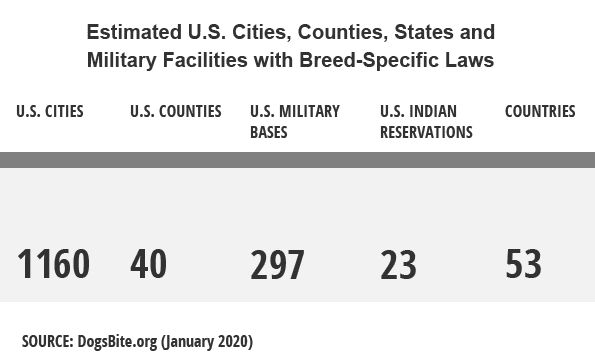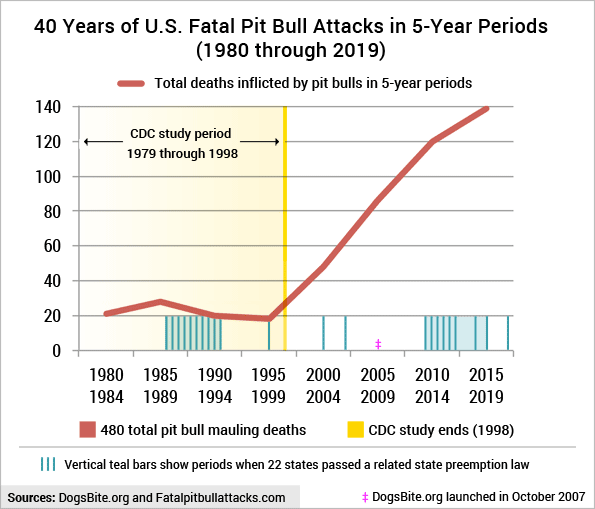
The top three regulated dog breeds: pit bulls, rottweilers and wolf-dog hybrids.
BSL Estimate 2019-2020
DogsBite.org - Since 2011, we have maintained an estimate of breed-specific laws across the United States, including breed-specific policies governing military housing. A decade ago, all three major military divisions -- U.S. Army, U.S. Marine Corps and U.S. Air Force -- banned a group of dangerous dog breeds, chiefly pit bulls, rottweilers and wolf-dog hybrids, due to the "unreasonable risk to the health and safety of personnel in family housing areas" these dog breeds pose.
In 2018, Delta Airlines became the first airline to ban pit bulls as service and support dogs, citing "untrained" pit bulls as a "potential safety risk."1
Our estimate is updated each December. Currently, over 1,100 cities, towns and villages regulate specific dog breeds for safety purposes and 40 counties have enacted countywide breed safety laws too. Jurisdictions in 39 different states have enacted breed-specific ordinances. Our estimate also tracks international breed-specific laws. Currently there are jurisdictions in at least 53 countries with breed-specific laws. In 42 of those countries, the regulation is a national-level law.
Many U.S. municipalities with breed-specific laws are concentrated in the Midwest. Other states, primarily preemption states, have virtually no breed-specific laws. In the early 1980s, cities began enacting breed-specific laws in response to grisly pit bull maulings. By 1992, dogfighting and dog breeder interests had pushed through preemption laws in ten states, including three of the most populous, California, Florida and Texas, prohibiting local jurisdictions from adopting pit bull laws.
There have been many horrific fatal maulings carried out by pit bulls and rottweilers in these three states ever since (See: Deaths After State Preemption). The most recent state to pass legislation in this area is Washington, which enacted a mandatory exemption law. The law requires cities with existing or new breed-specific laws to provide an exemption for the owners of regulated breeds if their dog passes the American Kennel Club's Canine Good Citizen (CGC) test or its equivalent.
2019 Legislative News
In 2019, only two states, Michigan and Missouri, faced actual state preemption bills, down from six states in 2018, nine states in 2016 and seven states in 2015. This may be a signal that Wave II of these preemption bills, 2012 to present day, is coming to a close. (Learn more about: Wave I and Wave II). During the 20-year CDC study period (1979 to 1998) pit bulls on average killed 20 people every five years. Now they kill nearly 140 people in a 5-year period, seven times more.
During the 2020 legislative session, South Carolina legislators may again review House Bill 3709 that requires registration to own a fertile pit bull. This is a bill that many states should be studying. Instead of preempting local pit bull ordinances, state legislators should be working to limit the excessive over breeding of pit bulls, which results in a large population of unwanted, unadoptable pit bulls continuously filling up city and county shelters and eventually having to be euthanized.
"Whereas, the pit bull dog is the most desired breed for dogfighting and is dying at a higher rate in local animal shelters than any other breed of dog in South Carolina; and
Whereas, fertile dogs are more likely to be territorial and therefore more likely to bite. Most dog bite fatalities are committed by dogs that were not altered; and
Whereas, requiring registration to own a fertile pit bull dog would provide a safety component for the public and the dog." - H 3709, 123rd Session, 2019-2020
Going against the "humane alliance," which typically opposes all breed-specific laws, Joe Elmore, CEO of Charleston Animal Society, supported the bill last year. "(The pit bull is) a wonderful dog, I have a pit bull type dog," Elmore said. "But we've got to cut down on the breeding. We've got to spay and neuter these dogs. Across shelters throughout the South, including South Carolina, they are dying at a much higher rate than other dogs because of the prevalence of them," he said.
Rental & Housing Properties
A substantial source of breed-specific policies, which our estimate does not track, are the million-plus rental properties governed by breed-specific leases in all 50 states.3 Rental property and insurance companies assess risk. Insurance carriers may refuse coverage for apartments, condominiums and homes if a lease fails to prohibit dog breeds on their blacklist. Private rental properties, HOAs and insurance agencies are typically unaffected by state preemption laws too.
When you combine the many types of breed-specific laws -- municipal ordinances, military policies, Indian reservation and public housing policies, airline policies, insurance blacklists and the tens of millions of Americans living in private rental properties governed by breed-specific leases -- one gains a clearer picture of these safety laws. They are designed to prevent serious attacks by high-risk dog breeds that are well recognized for inflicting severe bite injuries.
Our estimated summary of breed-specific laws is just one source of this prevention. When or if another state passes a preemption law peddled by an out-of-state special interest group, a source of this protection will be removed from that state, but other sources will remain, such as rental leases. Finally, the significance of breed-specific laws worldwide shows that the genetics of a dog breed remain the same, whether the dog lives in the U.S., France, South Korea or New Zealand.


Deaths inflicted by pit bulls have increased by 670% since the 5-year period of 1995 to 1999.
2The 40 Years of U.S. Fatal Pit Bull Attacks in 5-Year Periods chart is an extension of the 35 Years of U.S. Fatal Pit Bull Attacks in 5-Year Periods chart we released in 2015 when discussing the two waves of state preemption laws.
3We could find no estimate for the vast number of rental properties governed by breed-specific leases, but breed restrictions are common. According to the National Multifamily Housing Council, over 43 million households are renter-occupied and comprise over 100 million residents (34% of the U.S. population), all of which are subject to a lease agreement. Nearly one-third of these residents, 27 million, rent a unit within a multi-unit rental property.
Related articles:
12/22/18: Estimated U.S. Jurisdictions with Breed-Specific Laws (2018-2019)
01/01/20: Fatal Pit Bull Attacks - The Archival Record - DogsBite.org
01/01/20: Fatal Rottweiler Attacks - The Archival Record - DogsBite.org
04/23/18: Fatal Wolf-Dog Hybrid Attacks - The Archival Record - DogsBite.org
04/20/15: A Primer on State Preemption Laws and Charts for Advocates by DogsBite.org

Thank you for this detailed information. I pray to God that sanity will soon triumph over insanity. The international front looks interesting. If I recall correctly, Ireland is on the right track, and a few major cities in China are on the right track.
Thank you so much DogsBite.org for researching and the analysis of this data which makes the danger and risks of keeping pit bull dogs very clear. Who would put at risk their child, family, friends and neighbors exposing them to a high risk dog like a pit bull. Your research shows that countries all across the developed world have banned or regulated these dogs for good reasons. I suggest that readers get to know the Victims. Start with 2019 and learn the names of 36 people killed by pit bulls and their mixes. When you have a name and a face to link to the statistic these people and their awful suffering , the endless grief of their families becomes all too clear. Parents don’t risk your child’s life, face , limbs and scalp by putting a dog fancy before their safety. There is no redo. When a pit bull nails the results are forever and you will have to live with the guilt and make no mistake-You are guilty if you sacrifice your child’s life or limb to a pit bull fancy. Forevermore is as relentless and tenacious as the pit bull dog. The regret suffered by those who made bad decisions and subjected a family member to death by mauling of disfiguring, debilitating injuries that cerise people for life. Don’t adopt a pit bull. These dogs should br fased out.
Key question: How strictly are these Breed-Specific Laws enforced?
That’s the million dollar question. My city has BSL on the books, but it is not enforced whatsoever. Pit bulls are taken to street fairs and concerts, they run loose in parks, they are kept by the homeless. When a fatal attack happened in my city, the police pretty much came out and admitted they don’t enforce the law.
I have to ask, what do you think is the “magic number” of national deaths per year by pits and their mixes that will result in a serious national or whole-state level discussion in an outright ban in these dogs? 100? 365? 500? Is there a number? Or will it take something like national healthcare to be enacted and a certain dollar amount to result in the federal government to say enough is enough?
I would love to know where the belief that intact dogs are more territorial and therefore more likely to bite ever came from.
Intact male dogs are well-known to go exploring when they smell a bitch in heat. I thought neutering was supposed to keep the dog at home. So the intact male is roaming and territorial and the neutered male stays home and isn’t territorial. This makes no sense to me.
It’s very much reported that pit bulls invade schools and neighbors’ homes through doggy doors. Are these intact dogs being territorial or simply pit bulls allowed to roam and do as they please?
I have long felt that spaying/neutering of dogs has absolutely nothing to do with human aggression. What I do suspect is that owners of spayed/neutered pet dogs may treat them differently than owners of intact dogs. One only has to try to get pit bull owners to spay/neuter their dogs in order to realize there is a problem here.
I think the misinformation of intact dogs and cats being more aggressive has been derived from farm animals. Dairy bulls are incredibly more dangerous than steers (altered bulls). Dairy animals are bred to make top producing milk cows. They aren’t bred for behavioral traits as dogs are.
On the other hand, Border Collies can herd while intact. Pointers can point while intact. Dogs were bred to have certain traits. If that intact Border Collie didn’t herd or the intact Pointer didn’t point, it wasn’t used for breeding.
That Border Collie and that Pointer weren’t vicious either.
Although I think altering vicious dogs to prevent the production of offspring is a great idea, I think altering to treat aggression in dogs is ineffective.
If spaying/neutering worked in dogs to stop aggression, it would be great. However, how many altered dogs adopted from shelters have mauled/killed people and animals?
Interestingly enough, I think neutered male cats are far more territorial than tom cats. At least, my neutered male cat, Fred, will not allow any cat in his private garage. I suspect tom cats are less territorial so they can find mates.
I greatly appreciate your information. I have German Shepherd Dogs, and my unneutered males are not ever put in a pen with other unneutered males. I don’t want to risk the dominant male affecting the temperament of the other male, and I won’t risk them fighting. I don’t think they would kill each other.
As far as the females are concerned, fighters are fighters. Intact or altered is generally irrelevant. Many females don’t fight. Again, I’m not referring to fatal fights.
Personally, I think the most important factors in GSDs on behavior are training and socialization. I also believe this is true of most breeds.
However, I do not believe training/socialization/
altering will necessarily change explosive aggression so often seen in pit bulls, some other fighting breeds, and sporadically in other breeds..
At least, I cannot say I have seen a single case of explosive aggression in any breed fixed by training/socialization. One of the more troublesome dogs was a 140 pound,
1 1/2 year old intact male St. Bernard “Service Dog”
handled by a very nice teenage girl. He was started in classes under three months of age, continued in classes, and was kicked out of class for an unprovoked attack on a five month old female GSD puppy. This dog showed explosive aggression by ten weeks of age and got worse with time. He was mostly okay with people but never trustworthy with people. He was very dog aggressive.
The dog behaviors affected by altering are the behaviors caused by sex hormones, and I think this is now a widespread belief although there are still some veterinarians who erroneously believe that altering can fix fear-based biting.